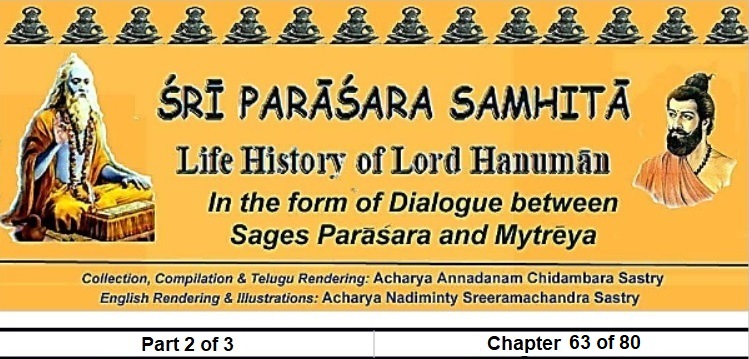
63rd Chapter (Trişaşţitama Paţalah)
“Narration of the Fire Sacrifice”
(Hōmaprakaraņam)
श्रीपराशरः
यस्मिन् देवे तु यो भक्तस्संपूजयति यो जनः
तद्दैवः पूजितस्तेन भक्तिस्तस्यातिनिश्चला।। 1
Śrī Parāśara:
Worship and Mantra
“An individual that worships a particular God form must have a firm devotion towards the same and knowledge of worship of that God. (1)
अज्ञानाद्यदि वा लोभात्तद्भक्तो यद्युपेक्षते
दैवं चोपेक्षितं तेन स एव भवति ध्रुवम्।। 2
If one neglects worship of the lord due to ignorance or miserliness, the lord will definitely neglect the desired wishes of that individual. (2)
यस्मिन् देवे तु यो भक्तः मन्त्रस्तस्मादवाप्यते
शीघ्रसिद्धिप्रदो मन्त्रो नाभक्तेभ्यः कदाचन।। 3
Whoever has devotion in the lord, will get the mantra because of that devotion. No one that is not a devotee will be able to definitely get fruition of the mantra. (3)
यस्य स्वप्ने भवेत्सूर्यचंद्रग्रहणदर्शनम्
मंत्रसिद्धिस्तु तस्याभूदिति मन्त्रविदो विदुः।। 4
Experts of the mantra studies say that whoever sees the sun and the moon will definitely get fruition of the mantra. (4)
मन्त्रोपदेशादुपरि शुभाशुभनिरीक्षणम्
षण्मासे यदि जायेत पूर्णे संवत्सरे यदि।। 5
One has to calculate auspiciousness and in-auspiciousness after imparting the mantra as follows. If within six months or one year after imparting the mantra, (5)
शुभदृष्ट्या तु गृह्नीयादशुभायां परित्यजेत्
विपर्यये त्वनिष्टस्स्याद् गृष्हस्थानां शुभैषिणाम्।। 6
If auspiciousness occurs, the same has to be accepted. If in-auspiciousness occurs, the same should be rejected. A mantra is poisonous, if it is inauspicious to a householder. (6)
भक्तानां तु मुमुक्षूणां वैपरीत्यं तु दोषभाक्
इत्यागमविशेषज्ञाः प्रवदंति मुनीश्वराः।। 7
Consider it as an error in a devotee desirous of liberty from the mundane world (mōkşa). So say those knowledgeable seers in matters of devotion, deity and worship. (7)
अन्यं विशेषंवक्ष्यामि लोकानामुपकारकम्।। 8
Worship Procedure
I am telling another special feature that does well to the world. (8)
श्वेतार्कमूलं शिखिविष्णुक्रान्तं
गोरोचनं कुम्कुमचन्दनं च
एतानि चूर्णानि ललाटपट्टे
त्रैलोक्यवश्यं मदनावतारम्।। 9
Wearing auspicious mark (tilak) on the forehead of a mixed powder of the root White Crown Flower plant, mayūraśikhi (a herb tonic for skin and hair), vişņkrānta (Morning Glory plant), gōrōjana (stones found in the organs of cow), kunkuma (pink dyed turmeric powder), candan (sandal), which makes it the madanāvatāra (Cupid incarnation) that conquers all the worlds. (9)
पुष्यार्के श्वेतगुंजायाः विधिना मूलमुद्धरेत्
उलूकाक्षीणि मधुना ख्यातं सर्वाव्म्जनं मतम्।। 10
The root of White Indian Licorice plant (Abruspraecatorious) has to be extracted, as prescribed, on a Sunday that also falls on puşya (γ, δ and θ Cancri, star constellation). Ulūkākşi (Owl’s Eye plant) root is to be brought and together well rubbed with honey to make the sarvānjana (all-purpose medicinal application). (10)
वृक्षगुल्मलतामूलं त्वक्पत्रं पुष्पकाण्डलम्। फलमूलाय मंत्रेण
हन हन द्वेष हुं फट्।। 11
Recite the root mantra along with words like ‘hanahana’, ‘dwēsha’, ‘humfat, while gathering trees, their bark, creeper, root, skin, leaf, flower, stem or fruit, (11)
स्वाहा यदर्थं दृष्टासीद्भूतलेन व्रतं ततः
स्वगतं तत्र तत्सिद्धिदृद्रृष्टा सर्वमहौषधैः।। 12
The process has to be completed by uttering the expression ‘swāhā’. This way, it will serve the purpose for which it was desired. Because of it, the ‘sarvamauşadhasiddhi’ (achievement of all great herbs) is obtained. (12)
गच्छ गौतम शीघ्रं त्वं ग्रामेषु नगरेषु च
आहारासनशय्यादीन्प्राशनान्परिकल्पयेत्।। 13
‘Gautama! Go to village and city fast, Arrange food, bed and other things’. So, one has to say – (Incomplete version is available). (13)
जूटाब्जं कलशं मंणिं शुकमथोद्यत्तालववृतं सुधा
पात्रं सांकुशपव्म्चसायकधनुःपाशं च वेत्रं करैः
सांदं वारि विपव्म्चिरत्नकलषान् शस्तैर्वहंतीं भजे
पाश्वेंभां गरुडासनां त्रिनयनां श्रीराजराजेश्वरीम्।। 14
I am serving and bowing to ŚreeRājarājēśwari, who resplendent with lotus like hair plaits, sitting in Garuda sitting posture, three-eyed and holdinga pot, a diamond, a parrot, cymbals (percussions instruments), an elephant goad, a bow made of sugarcane, a rope, a stick, valuable liquid, veeņa (stringed musical instrument) and a diamond studded vessel. (14)
गायत्रीयन्त्रमंत्रौ च प्राणस्थापनमेव च
दिक्पालभूतबीजानि यन्त्रस्यांगानि वै दश।। 15
Gayatri (Mantra of Mother Goddess), amulet (yantra), life-impartation (prņapratişţa), worship of the rulers of the cardinal direction (dhikpālakas), clearing of spirits (bhootasuddhi), sowing seeds – are the ten said to be the equipping acts, (Seems part of the original is missing here). (15)
दशधा यो न जानाति तस्य मन्त्रो निरर्थकः
संप्रदायविहीनस्य न मन्त्रस्सिद्धिदायकः।। 16
The efforts will be frutile for one that does not know the ten equipping acts. One not knowing the tradition will not obtain achievement of the mantra. (16)
मन्त्रस्सद्गुरुणा लब्धः सद्यस्सत्फलदायकः 17
And the mantra learnt from a proper guru only will give good results. (17)
गायत्रीं यः परित्यज्य जपेदन्यमनुं बुधः
न मनुस्तस्य फलदो नरकं चाधिगच्छति।। 18
Whoever recites any other mantra leaving aside the Gayatri mantra, the same will not give results. Further, he will go to hell. (18)
शठाय परशिष्याय दत्वा मृत्युमवाप्नुयात्
अरिणेव मनोर्बीजं भक्ष्यंस्याद्विजसत्तम।। 19
Mantra ‘Do’s and Don’ts
If the mantra is given fools and other unbecoming pupils, such a giver will get death.If the basic letter (beejākşara) is absent; Oh! Mytrēya! That will be the cause of death. (19)
लक्ष्मीबीजं तथा तारं मायामाद्यं तथा स्मृतम्
लक्ष्म्या संपत्समृद्दिस्स्यात् तारा मोक्षप्रदायिका।। 20
If the lakşmeebeeja (ŌmŚreem Hreem Lakşmeebhyōnamah) or tarāmāyābeeja (mystery saviour basic letter = Ōm) is the beginning of the mantra, then the lakşmeebeeja gives good wealth and tarāmāyābeeja is good for liberation from the mundane world. (20)
असाध्यां साधयेन्मायामिति मन्त्रविदो विदुः
सर्वेषामेव मन्त्राणामयमेव विनिश्चयः।। 21
Mantra specialists say that māyābeeja can make impossible things possible. This is so for all the mantras. (21)
प्रणवप्लुष्टबीजानां सिद्धारीन्नैव शोधयेत्
गृहीणामुत्तमं प्रोक्तं वानप्रस्थस्य मध्यमम्।। 22
One need not think pros and cons of the person in obtaining the mantra with the ‘Ōm’ in it. It is said that the best is to obtain the mantra from the householder, midways to obtain from those that retired to forests (vānaprasta), (22)
यतिभ्यश्चाधमं प्रोक्तं निरर्थं ब्रह्मचारिणाम्
गृष्हस्थादेव हि मनुं प्रकुर्वीत गुरूत्तमात्।। 23
And it is the worst and fruitless to obtain from mendicant sages (yati). Hence the mantra has to be learnt from gurus that are householders (gŗihastāśrama). (23)
सिद्धिर्भवति वै शीघ्रं इति गालवभाषितम्।। 24
It was told by Gālava (a celebrated sage of lore) that, in this manner, the mantra will give achievement fast. (24)
गृहस्थेन घृते मंत्रः तन्मन्त्रश्शीघ्रसिद्धिदः
वानप्रस्थेन यतिना चिरकालफलप्रदः।। 25
The mantra learnt from a householder guru will give achievement fast. Mantra learnt from a retired-to-forest or mendicant sages will take very long time for achievement. (25)
भक्तानां च मुमुक्षूणां नियमो नास्ति वै मुने।। 26
Oh! Great sage Mytrēya! But there is no stipulation for the reciting devotees for achievement of liberation (mōkşa). (26)
फलार्थीनां च जन्तूनां गृहस्थादेव योगदः।। 27
For people reciting to get achievement of a desire, learning from a householder is the best. (27)
विधुरेण तथा मंत्रं दांभिकेन कदाचन
न गृहणीयान्न गृहणीयाद्वर्जयेद्ब्रह्मचारिणम्।। 28
The mantra should never be accepted from a widower or a showy self-aggrandizing individual. Never accept from a bachelor; leave him in this respect. (28)
अज्ञश्चश्रद्दधानश्च संशयात्मा विनश्यति
तस्मात्सर्वप्रयत्नेन विश्वासः फलदायकः।। 29
One that is not knowledgeable, doubts the mantra from a guru, a doubtful one will wither away. So it will be fruitful to always have an immense faith in the mantra from a guru. (29)
आवाहनाद्यष्टमुद्राप्रकारः कथ्यते मया।। 30
The Eight Hand Gestures (aşţamudrā)
Oh! Mytrēya! Now, I will tell about the āvāhana (invitation) and the other eight gestures (mudras). (30)
आवाहनाद्यष्टमुद्रा
उच्चांजलिमधः कुर्यादिदमावाहनं भवेत्
इयन्तु विपरीतास्यात् तथा वै स्थापनी भवेत्।। 31
Putting both the hands together with inner side of the palms upside (anjali), lifting it up (say, up to the level of head), then turning the anjali down-facing towards you, is the āvāhana mudra. If the same process is done in the reverse manner is the sthāpanee mudra (establishment gesture). (31)
ऊघ्र्वांगुष्ठं मुष्टियुतं तथेयं सन्निधापिनी
अंतरंगुष्ठमुष्टिभ्यां मुद्रा भवति प्रार्थिनी।। 32
If both the fists are brought together with the thumbs showing upwards, it is the sannidhāpineemudra (being in the proximity, of the deity). If the same thing is done with the thumbs folded inside, it is the prārdhineemudra (prayer gesture). (32)
तर्जनीभ्यां परिभ्राम्य सकलीकरणं भवेत्
अजलिं चाघ्र्यवत्कुर्यात् परमाकरणं भवेत्।। 33
In the same position, if the thumbs are moved in a circular manner, it is the sakaleekaraņa mudra (gathering everything together). Putting both the palms together in front (approximately heart level), inside facing upwards, as though one is pouring water (arghyam), it is the paramakaraņamudra (making – the object or god being worshipped – the superior). (33)
परिवत्र्य करौ मन्त्रे तर्जनी च कनिष्ठिके
मध्यमानामिकायुग्मे स्थापयेत्तु परस्परम्
अमृतीकरणं नाम मुद्रेयं धेनुरूपिणी।। 34
Keeping on reciting the mantra, turning the palms upward facing and joining the thumbs and little fingers with the middle and the index fingers, it is known as the cow-form (dhēbhroopiņee) amŗteekaraņa mudra (nectar giving or making immortal). (34)
एतास्साधारणा मुद्राः दर्शयित्वा जपेन्मनुम्।। 35
The mantra has to be recited showing these general gestures. (35)
अवर्णक्रमम्
व ।।
आद्यो ग्निरुद्रग्रहनेत्रवेद
मार्तण्डदिगृतुदिग्गजषोडषेषु
मन्वन्तेबाणतुरंगवासरा….
स्त्रयोदशास्स्युस्स्वरवर्णमालिखेत्।। 36
Arvaņakramam (Order of Activity)
First (1) Agni -3 (fire), Rudra -11 (fierce form of Śiva), Graha -9 (planetVēda -4 (knowledge), Nētra -2 (eye), Mārtānda-12 (mid-day Sun), Dik -10 (cardinal direction), Ŗtu – 6 (season), Diggaja -8 (luminary, well-versed, giant), Agni -3 (fire) Şōdaśa – 16 (sixteen), Manvantara – 14 (A Mankind time scale), Bāņa – 6 (a sixteenth century poet), Turanga – 7 (horse), Vāsara – 15 (day of a week), Trayōdaśa – 13 (thirteen). (36)
अकरादिक्षकारांतं विलिखेत् षोडशकोष्ठके
सिद्धारीन्कल्पयेन्मंत्रं कुर्याच्छिद्धारिभिः पुनः।। 37
From ‘a’ to ‘kşa’ (Sanskrit) alphabets have to be written in sixteen parentheses. Then imagine the perfection-achievement (siddhāri) differences and divide the mantraas per such differences. (37)
स्वनामवर्णमारभ्य यावन्मंत्रार्णदर्शनम्
गणयेत्षोडशे कोष्ठे सिद्धारींश्च विंचिंतितः।। 38
Beginning from the letter in one’s name, divide the mantra till its proper true mantra form (mantrāņaswaroopa) as per the perfection-achievement differences, counting them in sixteen parentheses. (38)
सिद्धा सिद्धसूक्तजपात्साध्यमंत्रो निरर्थकः
सुसिद्धप्राप्तिमात्रेण साधकं भक्षयेदतः।। 39
Recitation of a cryptic axiomatic hymn (sookta, mantra) of achievement possibility-impossibility (sādhyāasādhya) is better than that of a mantra of achievement impossibility (asādhya) type. If it is only an easily-achievable type mantra, it will eat away the trier for achievement (sādhaka). (39)
द्विगुणस्साध्यसिद्धस्तु साध्यासाध्ये निरर्थकः
साध्यस्सुसिद्धार्थजपस्सिद्धारिश्रियं हरति।। 40
An achievement possibility-impossibility (sādhyāasādhya) mantra gives two times more fruition. It is futile if it is just an achievement-possible (sādhya) or achievement-impossible (asādhya) mantra. An achievement-possible (sādhya) or achievement possibility-impossibility (sādhyāasādhya) mantras would cause loss of wealth of achievers (siddhāh). (40)
अरिसिद्धं सुतं हन्यादरिसाध्यस्तु कन्यकां
पत्नीमथारिसिद्धस्तु आत्मानं हन्त्यरीवरः।। 41
An Arisiddha (achievable for the enemy) mantra causes death of son and also of wife. An arisādhya (enemy achievement-possibility) mantra causes death of a daughter. But only the enemy-based one causes death of self. (41)
उक्तद्विपादबन्धुघ्नं द्विःपदार्थगोत्रहं
अर्धोक्तपादजातिघ्नं पुत्रकन्यांगनात्महा।। 42
If two lines (pāda) are recited, it kills relatives. If there are two demeaning (insulting) words, the clan will end. If the lines are recited with meanings, it can destroy the race, including son, daughter, wife and others. (42)
देशे ग्रामे गुरौ भूपे मन्त्रे चैषधिदैवते
नामवर्णान्निगणयेदक्षरान्परितः क्रमात्।। 43
While reciting a mantra for (wellbeing of) the country, village, guru, king, medicament and the God, the letters of names have to be counted in proper order. (43)
उत्तमं हौमजाप्यं च पूजाजाप्यं च मध्यमं
अधमं मालिकाजाप्यमिति शतातपो ब्रवीत्।। 44
Fire Sacrifice
Śātātapa (an ancient wise seer) told that the recitation with fire sacrifice (hōmaroopa) is the best, recitation with worship procedure is midways and recitation using a rosary is the worst method. (44)
यतीनां ब्रह्मचारीणां नारीणां च विशेषतः
जपमात्रेण सिद्धिस्स्याद्विना होमं च तर्पणम्।। 45
For mendicants (yati), bachelors (brahmacāree) and especially for women the mantra will give achievement (mantrasiddhi) by just recitation. There is no need for fire sacrifice (hōma) or water offerings (tarpaņa). (45)
गुरुविश्वासमात्रेण तन्मन्त्रस्सिध्यति धु्रवम्।। 46
The mantra recited with full faith in the guru only will definitely give good results. (46)
अन्यद्रहस्यं वक्ष्यामि मैत्रेय शृणु तत्त्वतः
लोकोपारकं गोप्यं शष्ण्वतां पुण्यवर्धनम्।। 47
Oh! Mytrēya! I am telling another secret, but important thing. Listen attentively. Very useful to the world and a greatly secret. This can increase one’s balance of good deeds just by listening. But it is very secret. (47)
पुरश्चरणकष्न्मत्र्याे काम्यकर्माणि कारयेत्
अग्निमन्थं ततःकृत्वा यथाशास्त्रसुनिश्चितम्।। 48
An individual repeating (puraścaraņa) has to first perform his/her desired activities. Then, as per scriptures, the fire has to be stirred up (via friction fire stones). (48)
विश्वासास्तिक्यसंयुक्तः पूजयित्वा विनायकम्
अपूपैर्मोदकेैश्चैव फलत्रयसमन्वितैः
विहघ्नेशं पूजयेन्मन्त्री सर्वविघ्नोपशान्तये।। 49
First, with faith and spiritual feeling, for Vināyaka (Gaņēşa) has to be worshipped for removal of obstacles (vighna) and offered special food containing three fruits and deep fried rice cakes. (49)
दुर्गां चैव महाभागां वरदां सर्वसिद्धये
संपूज्य भक्ष्यभोज्याद्यैः ततः कर्माणि कारयेत्।। 50
Mother goddess Durga, has also to be worshipped for the bestowal of boons and for total attainment of the achievement (sarvasiddhi) with special food offerings and then continue with the required actions. (50)
पूर्वरात्रौ बलिं दत्वा प्रभाते होममाचरेत्
व्रीहिभिव्रीहिकामस्तु पयसा पशुमाप्नुयात्।। 51
After performing the ritual sacrifice the previous night, perform the fire-sacrifice (hōma) early the next morning. Those seeking to gain grains have to perform the fire sacrifice with paddy,those seeking many cows as property -with milk, (51)
आज्येन पुष्टिर्देवेशं इक्षुखण्डैश्च वश्यकम्
कन्यार्थी लाजहोमेन पुत्रार्थी कुमुदैर्नवैः।। 52
The fire sacrifice has to be performed by one who seek health and fulfilment of wishes – with ghee, those who seek control over others (vaseekaraņa) – with sugarcane pieces, one seeking a wife – with puffed rice, one seeking sons – with white lotus flowers. (52)
तिलतण्डुलहोमेन धनधान्यं प्रयच्छति
बिल्वहोमेन राज्यश्रीरपूपैर्नवपुत्रकम्।। 53
Performing fire sacrifice with sesame and rice gives plentiful paddy and money. Doing so with the leaves of bilwa/bael/Bengal quince tree (Aegle marmelos L) gives kingdom and – with fried rice cakes gives nine sons. (53)
ब्रह्मवर्चस्सकामस्तु पलाशसमिधैर्हुनेत्
स्त्रीवश्यं लवणेनैव वृष्टिकामस्तु वेतसैः।। 54
For obtaining the lusture of the Supreme Soul (Brahmavarcchas) performing fire sacrifice with palash treesticks (Butea monosperma), forcontrol of a lady – with salt, for rains –with betham tree sticks (Cycascircinalis L = Queen sago). (54)
शत्रुपक्षविनाशे तु विभीतकसमिद्धुनेत्
पिचुमन्दैस्तथाकुर्याच्छत्रुनाशाय मंत्रवित्।। 55
A mantra person performs fire sacrifice with twigs of Bahera tree (Terminalia bellirica) for destroying enemy forces and with neem or margosa sticks to defeat an enemy. (55)
राजानुग्रहमन्विच्छन् मधुहोमं तु कारयेत्।। 56
One desiring benevolence of a king has to perform fire sacrifice with honey. (56)
भुंजानः प्रथमं पिंडं यस्य नाम्ना भिमंत्रितः
सप्तकृत्वः पयःस्निग्धं सो पि वशयो भविष्यति।। 57
Fire sacrifice with a rice ball (pinda) dipped in milk, imparted with a person’s name, will bring him under the control of the mantra performer. (57)
यद्यत्पदार्थहोमेन तत्तत्प्राप्नोत्यसंशयः।। 58
Riches of the materials with which the homa is performed, will accrue without doubt. (58)
रोगा नश्यंति चात्यर्थं तस्य रोगस्य भेषजम्
होमयेद्धविभिर्यस्य तस्य रोगो विनश्यति।। 59
The hōma destroys diseases. The hōma is the medicine itself for the performer. A person by whom the hōma is performed will be free disease, if any. (59)
नित्यमन्नेन होतव्यं धनधान्यसमृद्धये
जपाच्छे्रष्ठतरं चैव तर्पणं च ततः परम्।। 60
For riches of grains and money one has to perform the fire sacrifice daily with cooked rice. It is good to perform water-pouring (tarpaņa) after the recitations. (60)
जपस्यांतेन देवेशि होमं कुर्याद्विषेषतः
मन्त्रषुद्धिस्तु कुर्वीत तस्य शान्त्यर्थमात्मनः।। 61
‘Oh! Pārvatee! After concluding the recitation, the fire sacrifice has to be especially performed. For the peace of one’s soul (ātmaśāti) purification of the mantra (mantraśuddhi) has to be performed’. Know that these facts were told by Śivato Pāvatee. (61)
निष्कलङ्कं नवं कुम्भं शुद्धतोयेन पूर्णयेत्
अष्टोत्तरसहस्थ्रेण संस्कृतबलिपूर्वकम्।। 62
Abhişēka – Bathing
‘A new earthen pot, without any defects, has to be filled with pure water. It has to be ritually improved (samskŗita) via recitation of the mantra 1008 times along with sacrifice. (62)
तेनाभिषेकं यः कुर्यात् मासे मासे च बुद्धिमान्
गृष्हक्षेत्रादिकं चैव आरामदेवतालयम्।। 63
A wise person performs abhişēka (dousing water) of house, court yard and the pillared vestibule of a temple. (63)
प्रासादं देवदेवेशि पिशाचादिं विभूषितम्
कृष्त्यादिभिश्च दुष्टैश्च मन्त्रध्यानपरायणः।। 64
Oh! Pārvatee! The one dedicated to the recitation of mantras, in places that are inhabited by bad spirits and where bad deeds take place, (64)
यत्र यत्र महादेवि वेशिकश्च घृतासनः
मृगव्याघ्रासनतलो तिलहोमन्तु कारयेत्
अयुतं वा सहस्त्रं वा एतद्दोषस्य नाशनम्।। 65
Oh! Great lady! At a residence or a seat or a deerskin seat or tiger skin seat exist; at all such places, fire sacrifice has to be performed a 10,000 or at least a 1,000 time. This removes the impurities, if any. (65)
तावद्भजेत कल्याणि दशरात्रं ततः परम्
अजं हत्वा बलिं दत्वा चार्धरात्रं च राजसम्।। 66
One has to remain so for ten days. Thereafter a goat has to be sacrificed with dignity. (66)
तत्रैव निवसेन्मन्त्री मौनध्यानपरायणः
मातृष्कान्याससंयुक्तः मंत्रन्याससमन्वितः।। 67
Then, a mantra reciter, keeping silent (maunadhyāna), having performed the mother goddess gesture (mātŗkānyāsa) and mantra and other gestures, has to stay at the same place. (67)
क्षेत्रवंतं गणैस्सार्धं सर्वदोषनिकृन्तनम्
सान्निध्यं कुरुते तस्य सर्वशातिः प्रयच्छति।। 68
Such a place would be divine and free from all impurities and attachment to such a place gives every type of peace to the mantra performer. (68)
ततः प्रातस्समुत्थाय स्नात्वा धौतांवरश्शुचिः
ब्राह्मणैर्गुणसंपन्नैः हनुमद्ध्यानतत्परः
पुण्याहं वाचयित्वा तु प्रोक्षयेत्सर्वभूतलम्।। 69
Then, getting up in the morning, having performed the regular ablutions, putting on washed clothes, meditating upon Hanumān, perform the puņyāhavacanam (recital to remove specific impurities) and sprinkle water (prōkşaņa) on that piece of land. (69)
राज्ञामेवं तु कार्या च महती दक्षिणा प्रिये
आपदुद्धारसिद्धिस्तु साक्षात्त्रैलोक्यनायकः।।
यत्र यत्र वशेन्मूर्तिः तत्र तत्र समृद्धयः।। 70
Oh! Pārvatee! Ruling kings have to perform similarly and give grand donations-gifts (bhooridakşiņa).’ (70)
![]()
इति श्रीपराशरसंहितायां श्रीपराशरमैत्रेयसंवादे होमप्रकारकथनं नाम त्रिषष्टितमःपटलः
Thus ends the 6rnd Chapter “Narration of the Fire Sacrifice”

Click here to visit the Contents of the Part 2.
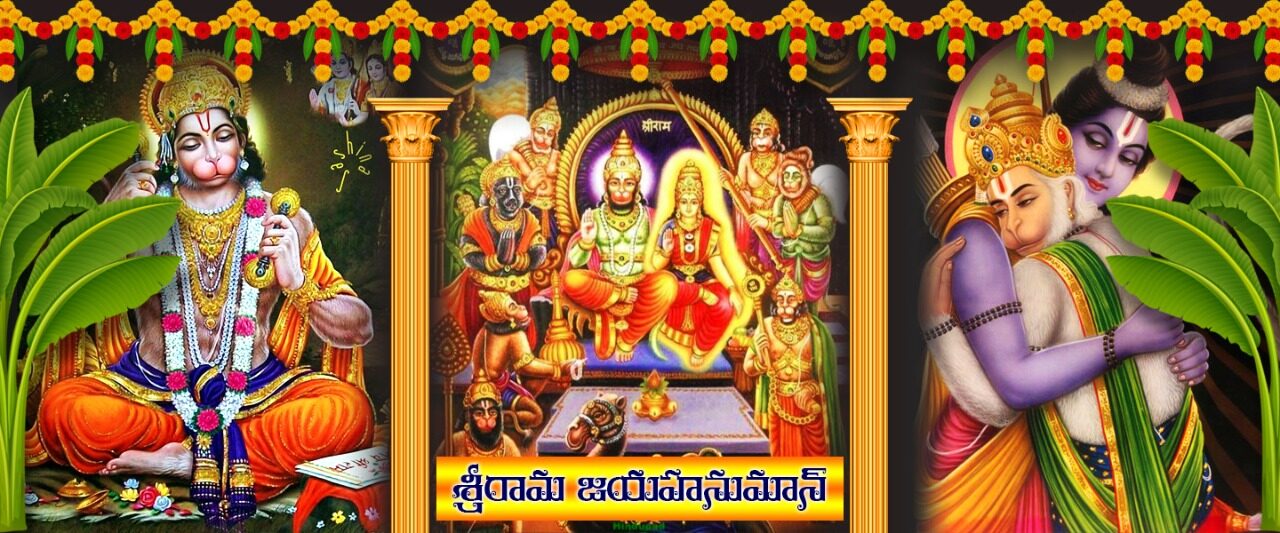

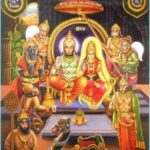

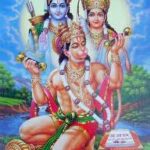
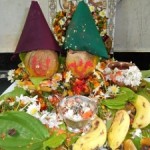

Be First to Comment